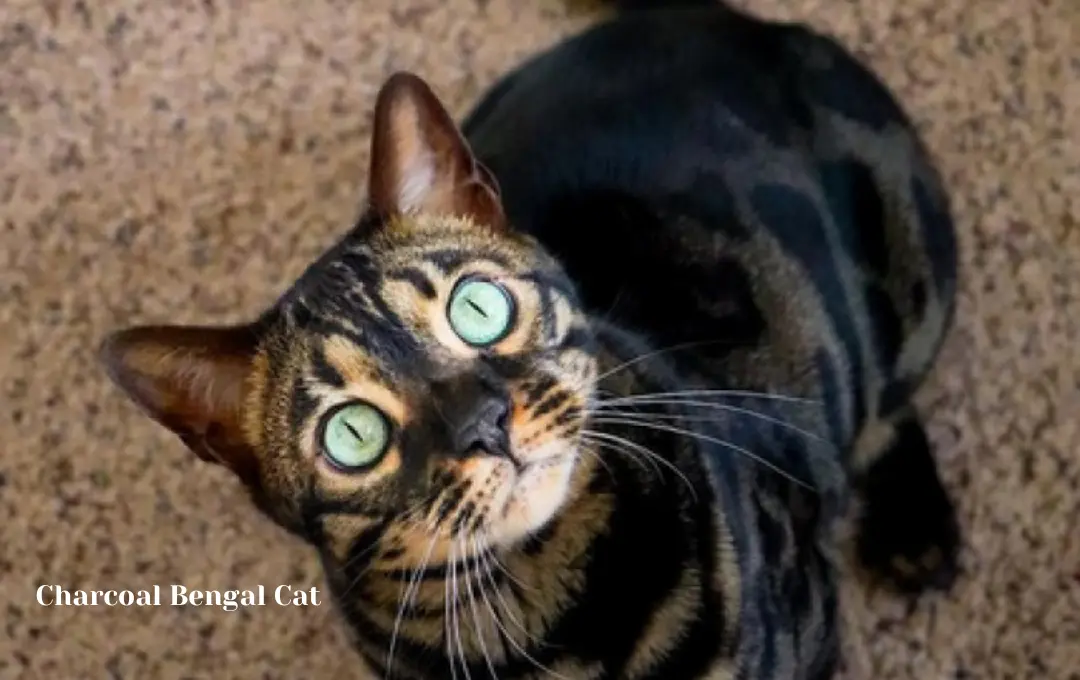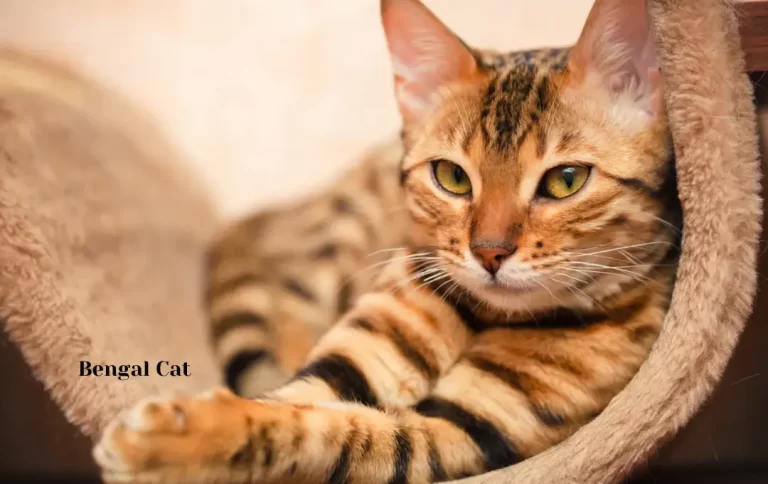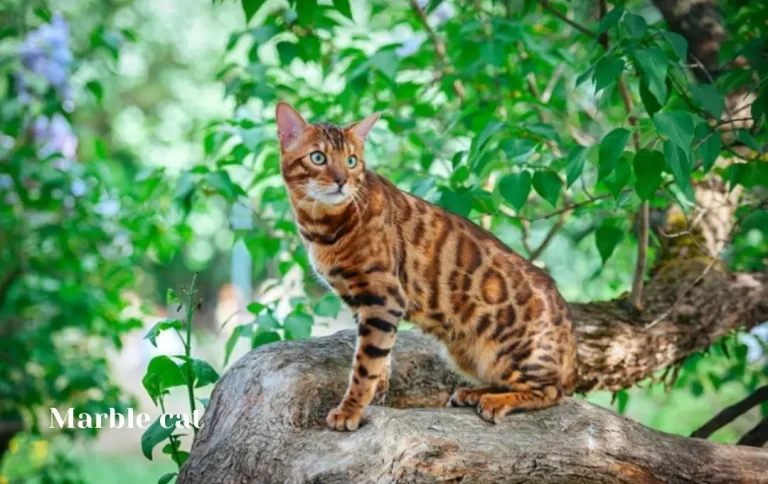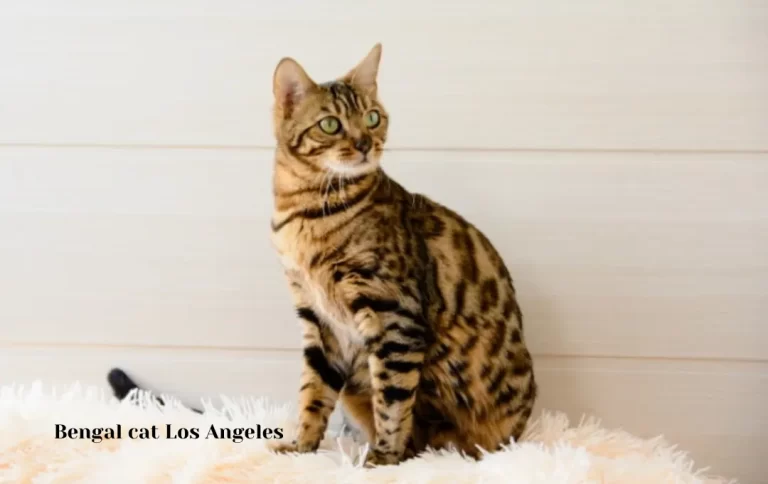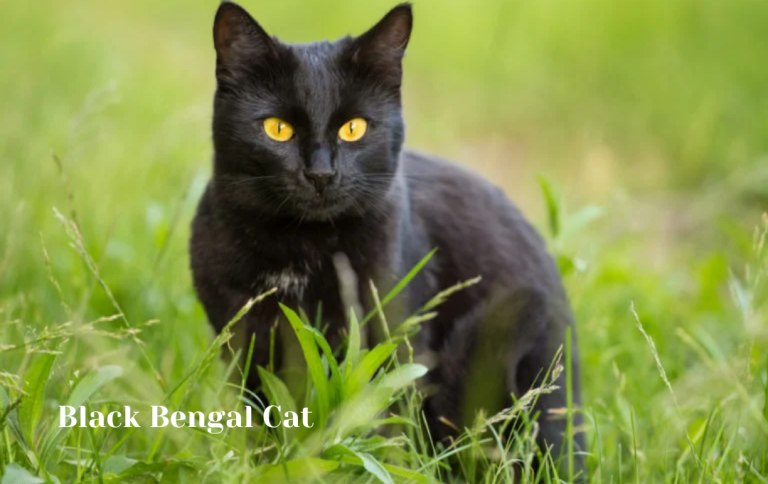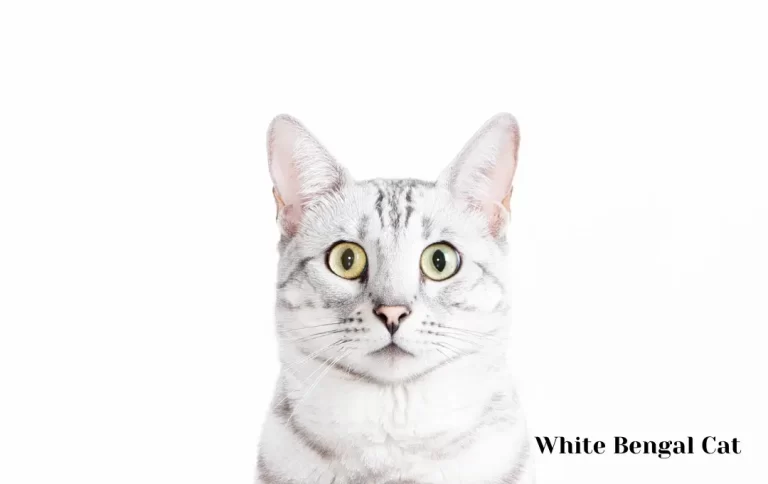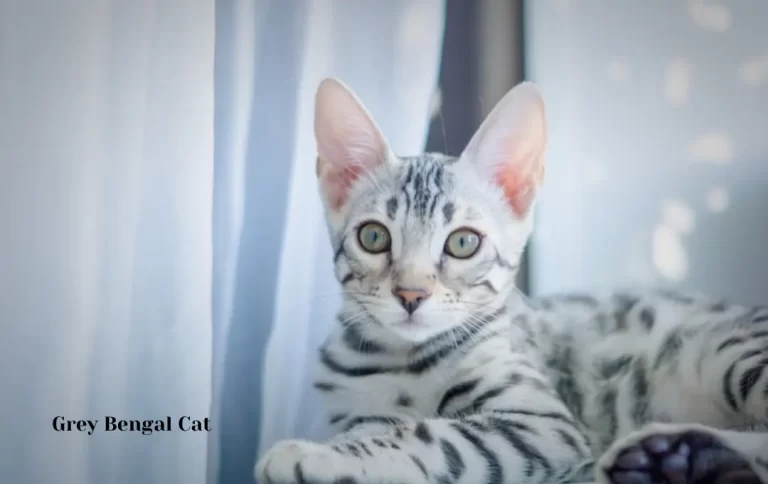Economical Charcoal Bengal Cat Price | How Much Does a Bengal Cat Cost? 2023 Price Guide
With its eye-catching and alluring coat pattern, the Charcoal Bengal cat has grown in popularity among cat lovers. The Charcoal Bengal cat, known for its similarity to wild cats with striking, dark markings against a lighter backdrop, has a distinct appearance that distinguishes it from other domestic feline companions.
In this comprehensive exploration of Charcoal Bengal cat prices, We will dig into the numerous factors that affect how much one of these remarkable feline companions will cost to buy. We will clarify the complexities of the economics of Charcoal Bengal cats, from the variables behind price changes to concerns for potential buyers. This comprehensive guide will give you useful insights into the world of Charcoal Bengal cat costs, whether you are a potential owner keen to comprehend the investment or a fan inquisitive about the nuances of the breed’s pricing.
Bengal Cats: Unique Coat Patterns
Bengal cats are renowned for their exotic and wild appearance, often described as “miniature leopards.” This resemblance is primarily attributed to their exquisite coat patterns, which are a result of their ancestry from the Asian leopard cat. Bengal cat coat patterns typically include rosettes, spots, and marbling. These striking patterns are one of the key reasons why Bengal cats are so highly prized by cat enthusiasts and breeders alike.
A Charcoal Bengal cat is a specific variation within the Bengal breed, characterized by its unique coat pattern. The term “Charcoal” refers to the darker and more pronounced markings on the cat’s coat. These markings can often resemble charcoal pencil strokes, hence the name. Charcoal Bengal cats have a distinctive appearance that sets them apart from other Bengal coat variations.
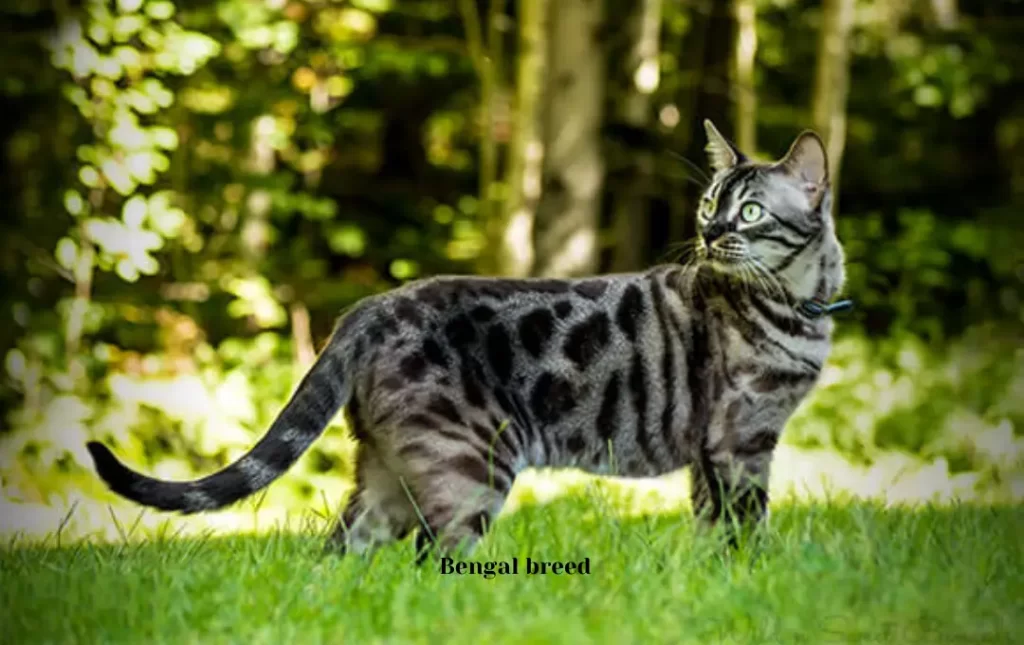
Characteristics of Charcoal Bengal Cats
Charcoal Bengal cats typically exhibit the following characteristics:
Dark and Bold Markings: The most noticeable feature of a Charcoal Bengal cat is its deep, bold, and well-defined markings. These markings contrast sharply with the background color of the coat, creating a striking appearance.
Reduced Background Color: In comparison to other Bengal coat patterns, Charcoal Bengals tend to have a lighter background color, which makes the dark markings even more prominent.
High Contrast: The high contrast between the markings and background color gives Charcoal Bengals a visually dramatic and captivating appearance.
Variations: Within the Charcoal category, there can be different sub-patterns, such as Charcoal Rosettes and Charcoal Marbling, each with its own unique charm.
Personality: While coat patterns don’t determine personality, Charcoal Bengal cats often share the breed’s energetic, playful, and affectionate traits.
Why Charcoal Bengal Cats Are Sought After
Charcoal Bengal cats are highly sought after for several reasons:
Unique Aesthetic Appeal: Their bold and dramatic coat patterns make them stand out and appeal to individuals who appreciate exotic and distinctive-looking cats.
Collectors’ Item: Charcoal Bengals are often considered collector’s items among Bengal enthusiasts and breeders due to their rarity and unique appearance.
Show Potential: Some Charcoal Bengal cats may have show potential due to the quality and distinctiveness of their coat patterns.
Breed Characteristics
Bengal cats are a distinct and captivating breed known for their unique combination of wild appearance and domestic temperament. Their striking coat patterns and colors, including the Charcoal variation, are key features that set them apart. Below, we’ll delve into the breed characteristics of Bengal cats, with a particular focus on their coat patterns and colors.
Wild Aesthetic:
Bengal cats are often described as “miniature leopards” due to their exotic and wild appearance.
This wild aesthetic is a result of their ancestry, as they were originally bred by crossing Asian leopard cats with domestic breeds.
Coat Patterns:
Bengal cats exhibit a variety of coat patterns, making them unique among domestic breeds.
The primary coat patterns in Bengal cats include:
a. Spots: Spotted Bengal cats have well-defined, rounded or oval-shaped spots scattered across their coat, resembling the rosettes found on leopards.
b. Rosettes: Rosetted Bengal cats have larger, more open spots with two or more colors inside, creating a rosette or doughnut-like pattern.
c. Marbling: Marbled Bengal cats have a more intricate pattern, resembling the swirls and marbling seen in some wild cats.
d. Charcoal: Charcoal Bengal cats, as mentioned earlier, have a distinct pattern with darker, more pronounced markings on a lighter background, creating a high-contrast appearance.
Coat Colors:
Bengal cats come in various coat colors, but the most common is the brown or spotted Bengal. Other recognized colors include:
a.Snow Bengal: These Bengals have a cream or off-white coat with brown or gray spots, resembling the coloration of a snow leopard.
b. Silver Bengal: Silver Bengals have a light silver background with dark gray or black spots.
c. Blue Bengal: Blue Bengals have a bluish-gray coat with black or dark gray spots.
d. Charcoal Bengal: As previously described, Charcoal Bengals have bold, dark markings on a lighter background, which can vary in shades from charcoal gray to almost black.
Muscular Build:
Bengal cats have a strong, muscular build that contributes to their athletic and agile nature.
They are medium to large-sized cats with long, lean bodies and a sleek appearance.

Are Bengal cats more muscular?
Bengal cats have smallish, round heads, large eyes, and striking facial markings. They have strong muscular bodies.
Personality Traits:
Bengal cats are known for their active and playful personalities.
They are highly intelligent and require mental stimulation, often enjoying interactive toys and puzzles.
Bengal cats are social and can form strong bonds with their human companions.
Vocalization:
Bengals are not particularly vocal, but they may “chirp” or make other unique sounds, possibly reflecting their wild ancestry.
Charcoal Bengal Cat Traits
Charcoal Bengal cats are a captivating variation within the Bengal breed, known for their distinct and striking coat pattern. In this section, we’ll explore the traits of Charcoal Bengal cats in detail, as well as discuss how this pattern differs from other Bengal coat patterns.
Characteristics of Charcoal Bengal Coat Pattern
Dark and Bold Markings:
The most prominent feature of Charcoal Bengal cats is their bold, dark, and well-defined markings. These markings often resemble charcoal pencil strokes, giving them their name.
Charcoal markings are typically deep black or very dark brown, creating a high-contrast appearance against the lighter background of the coat.
Reduced Background Color:
Compared to other Bengal coat patterns, Charcoal Bengals tend to have a lighter background color. This lighter background accentuates the dark markings, making them stand out even more prominently.
High Contrast:
The high contrast between the markings and the background is a hallmark of the Charcoal coat pattern. This contrast creates a visually dramatic and captivating appearance.
Pattern Variations:
Within the Charcoal category, there can be different sub-patterns, such as Charcoal Rosettes and Charcoal Marbling.
Charcoal Rosettes are characterized by dark, well-defined spots with two or more colors inside, creating a rosette or doughnut-like pattern.
Charcoal Marbling features intricate, swirling patterns with dark and light areas, resembling the marbled appearance of some wild cats.
Spot Distribution:
Charcoal Bengal cats may have spots or rosettes that are evenly distributed across their coat, creating a balanced and symmetrical appearance.
Differences from Other Bengal Coat Patterns
Spotted Bengals:
Spotted Bengal cats have rounded or oval-shaped spots scattered across their coat, but these spots may be smaller and more numerous than those of Charcoal Bengals.
Charcoal Bengals often have larger and bolder markings in comparison.
Rosetted Bengals:
Rosetted Bengal cats have larger, open spots with two or more colors inside, forming rosette patterns.
Charcoal Bengals may also have rosettes, but the Charcoal pattern places more emphasis on the boldness and darkness of the markings.
Marbled Bengals:
Marbled Bengal cats have intricate, swirling patterns that resemble marbling on some wild cats.
Charcoal Marbling may exhibit a similar intricate pattern but with a distinctive Charcoal high-contrast appearance.
Color Variations:
Charcoal Bengals are known for their darker markings on a lighter background.
Other Bengal coat patterns may have different color variations, such as brown, snow, silver, or blue, each with its unique charm.
In summary, Charcoal Bengal cats are distinguished by their bold and dramatic coat pattern, characterized by dark, well-defined markings on a lighter background. This high-contrast pattern sets them apart from other Bengal coat variations like Spotted, rotted, and Marbled Bengals, each of which has its unique characteristics and aesthetic appeal. Charcoal Bengals are highly sought after by those who appreciate their striking appearance and distinctive coat pattern.
Prices of Charcoal Bengal Cats: Factors
The price of Charcoal Bengal cats can vary significantly based on several factors. Potential buyers should consider these factors when evaluating the cost of acquiring a Charcoal Bengal cat:
Breeder Reputation and Location
Breeder Reputation: The reputation of the breeder plays a significant role in determining the price of Charcoal Bengal cats. Reputable breeders with a history of producing healthy, well-socialized, and high-quality Bengal cats tend to charge higher prices. These breeders often adhere to ethical breeding practices and prioritize the health and well-being of their cats.
Location: The geographic location of the breeder can also impact the price. Bengal cats from breeders in areas with a high cost of living or where Bengal cats are in high demand may be more expensive.
Pedigree and Lineage
Pedigree: The pedigree of a Charcoal Bengal cat, which documents its ancestry and lineage, can significantly influence its price. Cats with pedigrees that include champion show cats or other notable lineage distinctions may command higher prices.
Genetic Traits: If the Charcoal Bengal cat carries desirable genetic traits, such as a unique coat pattern or a specific coloration, its price may be higher. Breeders often charge more for cats with exceptional traits.
Coat Quality and Markings
Coat Quality: The overall quality of the cat’s coat, including its texture, sheen, and condition, can impact its price. Cats with exceptionally soft, glossy, and well-maintained coats may be priced higher.
Markings: The quality of the Charcoal coat pattern and markings is a significant factor. Cats with bold, well-defined, and highly contrasted markings are often considered more valuable within the Charcoal Bengal category.
Age and Training
Age: The age of the Charcoal Bengal cat can affect its price. Kittens are usually more expensive than adult cats, as they have their entire lives ahead of them.
Training and Socialization: Charcoal Bengal cats that have been well-socialized and trained in basic manners and litter box use may be priced higher, as they require less immediate investment in training.
Registration and Documentation
Registration: Charcoal Bengal cats with official registration papers from recognized cat breed associations, such as The International Cat Association (TICA), may be more expensive.
Health Records: Cats with up-to-date vaccination records and a clean bill of health from a veterinarian may command higher prices.
Demand and Availability
The demand for Charcoal Bengal cats and their availability in the market can influence pricing. If Charcoal Bengals are in high demand but limited in supply, prices may rise accordingly.
Additional Expenses:
Buyers should also consider additional expenses associated with owning a Bengal cat, such as ongoing veterinary care, grooming, high-quality cat food, and accessories. These costs should be factored into the decision-making process.
In summary, the price of a Charcoal Bengal cat is influenced by a combination of factors, including the breeder’s reputation and location, the cat’s pedigree and lineage, the quality of its coat and markings, its age and training, registration and documentation, demand and availability in the market, and any additional expenses associated with cat ownership. Buyers should carefully evaluate these factors when determining the cost of acquiring a Charcoal Bengal cat and choose a reputable breeder who prioritizes the welfare of the cats.
Average Charcoal Bengal Cat Prices
The price of Charcoal Bengal cats can vary depending on several factors, including the cat’s age, quality, pedigree, breeder reputation, and geographic location. However, I can provide a general price range for Charcoal Bengal kittens and adults as of my last knowledge update in September 2021.
Charcoal Bengal Kitten Prices:
Low-end: Charcoal Bengal kittens from less reputable breeders or those without pedigrees may be available in the range of $800 to $1,500.
Mid-range: Charcoal Bengal kittens from reputable breeders with good pedigrees and health guarantees typically fall in the range of $1,500 to $3,000.
High-end: Exceptional Charcoal Bengal kittens from top-tier breeders with show-quality traits and champion bloodlines can command prices ranging from $3,000 to $5,000 or even higher.
Charcoal Bengal Adult Cat Prices
Low-end: Adult Charcoal Bengal cats that are no longer breeding or show-quality may be available for adoption or purchase at lower prices, ranging from $500 to $1,500.
Mid-range: Healthy and well-socialized adult Charcoal Bengal cats with good pedigrees may be priced in the range of $1,500 to $3,000.
High-end: Charcoal Bengal cats with exceptional traits, such as unique coat patterns or markings, may be priced as high as $3,000 to $5,000 or more, even as adults.
Regional Variations in Prices
Prices for Charcoal Bengal cats can vary significantly depending on the region and local demand. Here are some regional variations to consider:
United States: In the United States, Bengal cat prices tend to be higher in urban areas with a higher cost of living, such as New York City or Los Angeles. Prices can also vary between states and regions based on the availability of breeders and the local demand for Bengal cats.
Europe: Prices for Charcoal Bengal cats in European countries can also vary based on location. Major cities and affluent regions may have higher prices, while less densely populated areas may offer lower prices.
Asia: Bengal cats have gained popularity in Asian countries as well. Prices in countries like Japan, South Korea, and Singapore may be influenced by local demand and the availability of reputable breeders.
Other Regions: Prices may vary in other regions as well, so it’s essential to research local breeders and their pricing policies.
Keep in mind that these price ranges are general estimates and can change over time due to factors like supply and demand, changes in breeder practices, and economic conditions. Additionally, it’s crucial to choose a reputable breeder who prioritizes the health and well-being of their cats, as lower prices may sometimes indicate poor breeding practices or neglect of essential health checks. Always research and visit breeders personally before making a purchase or adoption decision.
How to Choose a Reputable Breeder of Bengal Cats in Charcoal
Research Breeders: Start by researching Bengal cat breeders in your area or within a reasonable distance. You can use online breeder directories, Bengal cat forums, or recommendations from local cat clubs and veterinarians.
Check Breeder Associations: Reputable breeders often belong to recognized cat breeding associations, such as The International Cat Association (TICA) or the Cat Fanciers’ Association (CFA). Check their websites or contact these associations for breeder referrals.
Visit the Breeder: Schedule a visit to the breeder’s facility or cattery. This allows you to assess the living conditions of the cats and kittens, as well as meet the breeder in person. Reputable breeders are usually open to visits from potential buyers.
Ask Questions: Prepare a list of questions to ask the breeder, including questions about the cat’s health, pedigree, socialization, and any genetic testing for common Bengal cat health issues.
View Pedigrees and Health Records: Reputable breeders provide pedigrees and health records for their cats, including vaccinations and screening for common genetic conditions. Make sure the breeder can provide these documents.
Meet the Cats: Spend time interacting with the kittens and adult cats. Observe their behavior, temperament, and socialization. Well-socialized Bengal cats should be friendly and curious.
References: Ask the breeder for references from previous buyers. Contact these references to inquire about their experiences with the breeder and their Bengal cats.
Health Guarantee: Reputable breeders often offer a health guarantee for their kittens. Make sure you understand the terms of the guarantee and what it covers.
Contract: Review the purchase contract carefully. It should outline the responsibilities of both the buyer and the breeder, including spaying/neutering requirements for non-breeding pets.
Ongoing Support: A good breeder should be willing to provide ongoing support and advice as you care for your Charcoal Bengal cat. They should be available for questions and guidance.
Warning Signs of Potential Scams
Unrealistic Prices: Be cautious if the price of a Charcoal Bengal cat seems too good to be true. Extremely low prices can indicate a scam or poor breeding practices.
Lack of Transparency: If a breeder is unwilling to provide pedigrees, health records, or allow visits to their cattery, it may be a red flag.
Multiple Available Breeds: Be wary of breeders who offer a wide variety of cat breeds. Reputable breeders typically specialize in one or a few breeds and have expertise in those breeds.
Unprofessional Websites: Poorly designed or uninformative websites can be a sign of a less reputable breeder. Look for breeders with informative websites that provide details about their breeding program and cats.
Pressure to Buy Quickly: Scammers may try to pressure you into making a quick decision. Take your time to research and evaluate the breeder.
Payment Methods: Be cautious if the breeder insists on only accepting cash payments or wire transfers. Reputable breeders often accept multiple payment methods.
Shipping Kittens Sight Unseen: Avoid breeders who want to ship a kitten to you without you having the opportunity to visit in person or meet the kitten.
No Contracts or Health Guarantees: If there is no written contract or health guarantee, or if the terms seem unclear or unfair, consider it a warning sign.
Remember that finding a reputable breeder takes time and diligence. Always prioritize the well-being and health of the Charcoal Bengal cat you plan to bring into your home and be willing to walk away from any situation that raises doubts or concerns.
Cost of Owning a Charcoal Bengal Cat
Owning a Charcoal Bengal cat involves ongoing expenses beyond the initial purchase price. Bengal cats are known for their active and playful nature, which means they require proper care and attention. Here are some of the ongoing expenses associated with owning a Charcoal Bengal cat:
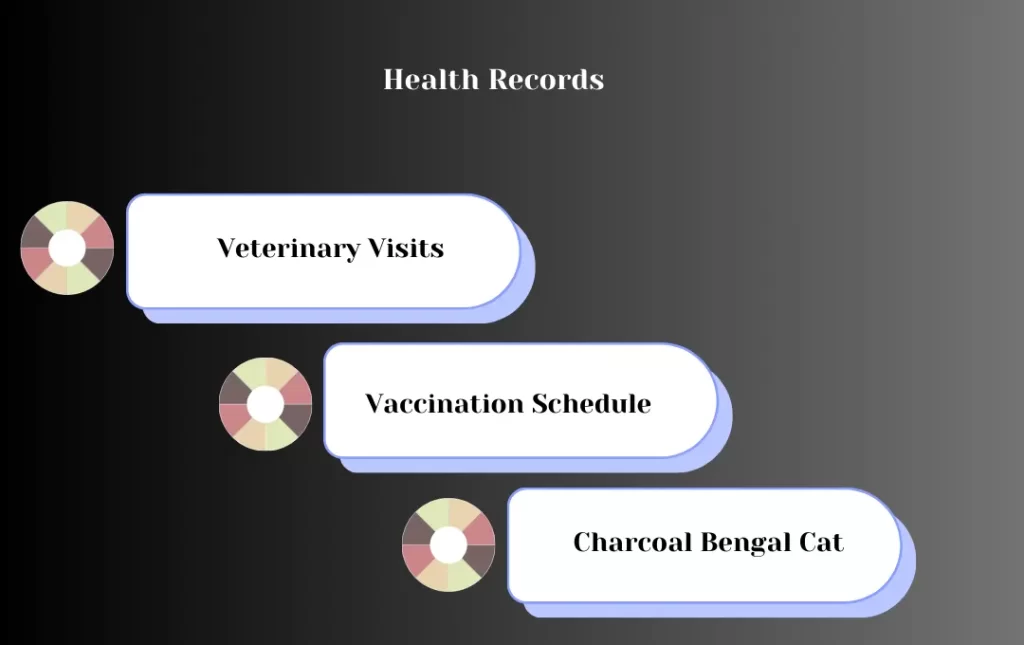
Food:
High-quality cat food is essential for your Charcoal Bengal’s health. Bengal cats benefit from a balanced diet that includes a mix of dry and wet cat food.
Expect to spend around $20 to $60 per month on cat food, depending on the brand and quality.
Veterinary Care:
Regular veterinary check-ups are crucial to ensure your Charcoal Bengal’s well-being. This includes vaccinations, dental care, and preventive treatments for parasites.
Budget for annual check-ups and vaccinations, which can cost approximately $150 to $300 per year. Additional expenses may be incurred if your cat has health issues or emergencies.
Grooming:
Bengal cats have a short and sleek coat that requires minimal grooming. Regular brushing can help reduce shedding and hairballs.
You may spend around $10 to $20 on grooming supplies such as a brush and nail clippers.
Litter and Supplies:
Budget for cat litter, litter boxes, and cleaning supplies. This can amount to approximately $10 to $20 per month.
Invest in toys, scratching posts, and other accessories to keep your Bengal mentally and physically engaged.
Pet Insurance:
Consider pet insurance to help cover unexpected veterinary expenses. Premiums vary depending on the coverage you choose but can range from $20 to $50 per month.
Training and Socialization:
Proper training and socialization are important for Bengal cats. This may include the cost of training classes or behavior consultation if needed.
Licensing and Microchipping:
Check your local regulations for pet licensing requirements. Microchipping your Bengal cat is a good practice in case it ever gets lost.
Boarding or Pet Sitting:
If you need to travel and can’t take your cat with you, budget for boarding or pet-sitting services.
Emergency Fund:
Set aside money for unexpected veterinary emergencies. Having an emergency fund can help ensure your cat receives prompt care in case of illness or injury.
Replacement Costs:
Keep in mind that cats can occasionally damage or destroy items in your home. Budget for potential replacement costs for damaged furniture or belongings.
In total, the ongoing expenses of owning a Charcoal Bengal cat can vary depending on your location, the specific needs of your cat, and your personal preferences. On average, you can expect to spend between $50 and $100 per month on food, litter, and routine care. However, it’s important to be prepared for additional expenses, including unexpected veterinary bills, to provide the best possible care for your beloved Charcoal Bengal cat.
Adoption and Rescue Options for Charcoal Bengal Cats
Adopting a Charcoal Bengal cat from a shelter or rescue organization can be a rewarding experience. Here’s some information on adopting a Charcoal Bengal cat from these sources, as well as considerations for adopting an adult cat:
Finding Charcoal Bengal Cats in Shelters and Rescues
While Bengal cats, including Charcoal Bengals, are less common in shelters compared to traditional domestic cats, they can still end up in rescue organizations due to various reasons, including changes in their owners’ circumstances.
Start your search by checking local animal shelters, breed-specific rescue organizations, and online pet adoption platforms.
Benefits of Adopting from Shelters and Rescues
Giving a Home to a Cat in Need: By adopting from a shelter or rescue, you’re providing a home to a cat in need. Many Bengal cats in rescues are loving and deserving of a forever home.
Cost Savings: Adoption fees are typically lower than the purchase price from breeders. The cat may also be spayed/neutered, vaccinated, and microchipped, saving you on initial vet costs.
Considerations for Adopting an Adult Charcoal Bengal Cat:
Temperament Assessment: When adopting an adult Charcoal Bengal, inquire about the cat’s temperament and behavior. Spend time interacting with the cat to ensure it’s a good fit for your household.
Behavioral History: Ask about the cat’s behavioral history, including any past health issues, socialization experiences, and interactions with other pets or children.
Adjustment Period: Understand that adult cats, especially those with unknown backgrounds, may take some time to adjust to a new environment and establish trust.
Health Evaluation: Request the cat’s medical records and have a thorough veterinary check-up soon after adoption to address any health concerns.
Patience and Training: Be patient and willing to invest time in training and socialization if needed. Adult cats can still learn and adapt to new routines and behaviors.
Environmental Enrichment: Provide a stimulating environment with toys, scratching posts, and climbing structures to keep your Bengal mentally and physically engaged.
Be Prepared for the Adoption Process:
Adoption processes may vary depending on the shelter or rescue organization. Be prepared to complete an adoption application, provide references, and go through an interview or home visit.
Ensure you meet any specific requirements or conditions set by the organization, such as providing a safe and secure living environment for the cat.
Ethical Considerations:
Always adopt from reputable shelters and rescue organizations that prioritize the well-being of their animals. Avoid supporting illegal breeding or backyard breeding operations.
Remember that every Charcoal Bengal cat has its unique history and personality. Adopting an adult cat can be a fulfilling experience as you offer a loving home to a cat in need. Be patient, provide love and care, and you’ll likely develop a strong bond with your rescued Charcoal Bengal cat.
Charcoal Bengal Cat Price Trends
Charcoal Bengal cat price trends, like the prices of other cat breeds, can be influenced by various factors, and these trends can change over time. While I can provide some insights based on historical information up to my knowledge cutoff date in September 2021, it’s important to note that prices can fluctuate based on supply and demand, breeder practices, and other economic and social factors. Here are some considerations regarding Charcoal Bengal cat price trends:
Historical Price Trends
Rarity and Popularity: Charcoal Bengal cats have been considered a relatively rare and unique variation within the Bengal breed. As such, they often commanded higher prices compared to other Bengal coat patterns. Their unique appearance and their fascination with Bengal cats contributed to their popularity.
Breeder Practices: The pricing of Charcoal Bengal cats can vary among breeders. Established and reputable breeders who focus on producing high-quality Charcoal Bengals with desirable traits tend to charge higher prices.
Geographic Variations: Prices can also vary by geographic region. In areas with a high cost of living or strong demand for Bengal cats, prices may be higher than in less densely populated regions.
Potential Future Changes
Supply and Demand: Changes in the supply of Charcoal Bengal cats, along with shifts in demand among prospective cat owners, can influence prices. If Charcoal Bengals become more popular, prices may rise.
Breeder Practices: As breeders continue to refine their breeding programs and produce cats with even more desirable Charcoal patterns, this could affect pricing. High-quality Charcoal Bengal cats may command higher prices.
Economic Factors: Economic conditions, including inflation and changes in the overall cost of pet ownership, can impact prices for Bengal cats and other breeds.
Factors Influencing Price Fluctuations
Breeder Reputation: Breeders with established reputations for ethical breeding practices and producing healthy, well-socialized cats tend to charge premium prices.
Pedigree and Lineage: Cats with champion bloodlines and pedigrees may be priced higher due to their lineage and potential for show quality.
Coat Quality: Charcoal Bengals with exceptional coat quality, including bold and distinct markings, may be priced higher.
Regional Differences: Prices can vary significantly between regions, cities, and countries based on factors like demand, supply, and the cost of living.
Coloration and Pattern: Unique or rare coat patterns and colors within the Charcoal category may influence prices.
Health and Veterinary Care: Cats with up-to-date health records, vaccinations, and preventive care may be priced slightly higher due to reduced initial veterinary expenses for the buyer.
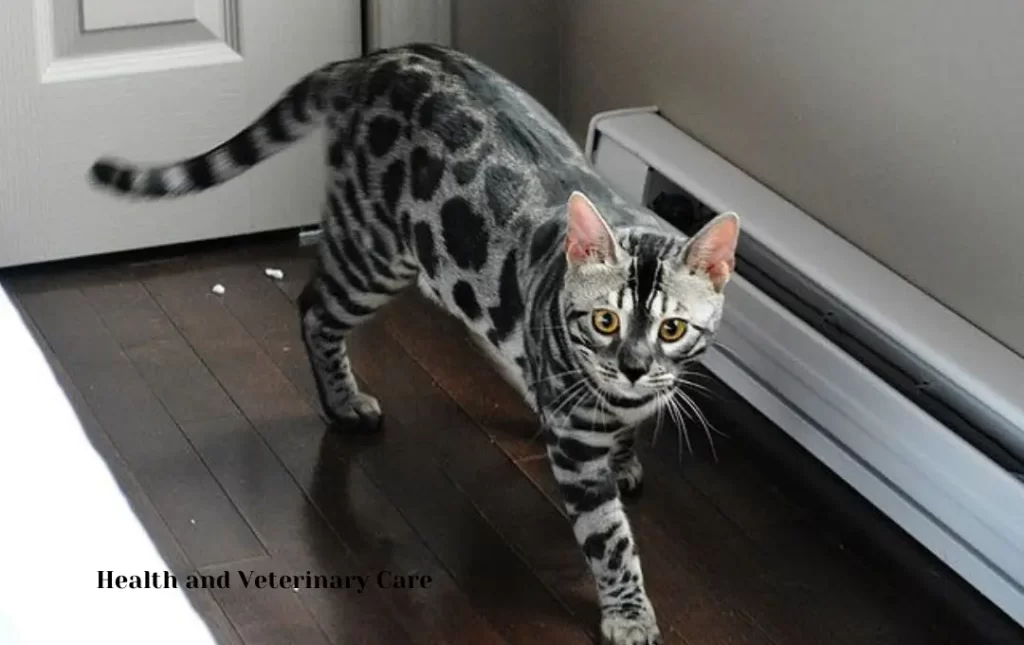
It’s essential for potential buyers to research the current market and engage with reputable breeders who prioritize the welfare of their cats. Prices can fluctuate, so it’s wise to be patient and informed when considering the purchase of a Charcoal Bengal cat. Additionally, always prioritize the well-being and health of the cat over the price, as responsible ownership should be the primary concern.
frequently asked question
Conclusion
In conclusion, Charcoal Bengal cats are an intriguing and distinctive subset of the Bengal breed, distinguished by their eye-catching and flamboyant coat patterns. Based on elements such as breeder repute, lineage, coat quality, location, and the particular characteristics of the individual cat, the cost of a Charcoal Bengal cat can vary significantly.
On average, you can expect to pay between $1,500 to $3,000 or more for a Charcoal Bengal kitten from a reputable breeder. Prices for adult Charcoal Bengal cats may vary, with some available for adoption or purchase at lower prices.

